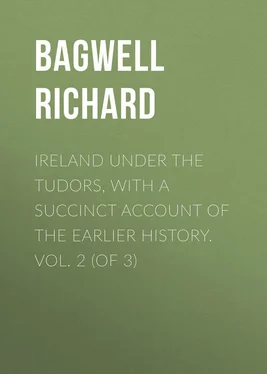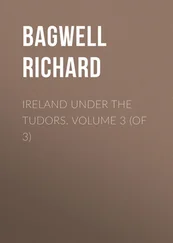Richard Bagwell - Ireland under the Tudors, with a Succinct Account of the Earlier History. Vol. 2 (of 3)
Здесь есть возможность читать онлайн «Richard Bagwell - Ireland under the Tudors, with a Succinct Account of the Earlier History. Vol. 2 (of 3)» — ознакомительный отрывок электронной книги совершенно бесплатно, а после прочтения отрывка купить полную версию. В некоторых случаях можно слушать аудио, скачать через торрент в формате fb2 и присутствует краткое содержание. Жанр: foreign_antique, foreign_prose, Историческая проза, на английском языке. Описание произведения, (предисловие) а так же отзывы посетителей доступны на портале библиотеки ЛибКат.
- Название:Ireland under the Tudors, with a Succinct Account of the Earlier History. Vol. 2 (of 3)
- Автор:
- Жанр:
- Год:неизвестен
- ISBN:нет данных
- Рейтинг книги:4 / 5. Голосов: 1
-
Избранное:Добавить в избранное
- Отзывы:
-
Ваша оценка:
- 80
- 1
- 2
- 3
- 4
- 5
Ireland under the Tudors, with a Succinct Account of the Earlier History. Vol. 2 (of 3): краткое содержание, описание и аннотация
Предлагаем к чтению аннотацию, описание, краткое содержание или предисловие (зависит от того, что написал сам автор книги «Ireland under the Tudors, with a Succinct Account of the Earlier History. Vol. 2 (of 3)»). Если вы не нашли необходимую информацию о книге — напишите в комментариях, мы постараемся отыскать её.
Ireland under the Tudors, with a Succinct Account of the Earlier History. Vol. 2 (of 3) — читать онлайн ознакомительный отрывок
Ниже представлен текст книги, разбитый по страницам. Система сохранения места последней прочитанной страницы, позволяет с удобством читать онлайн бесплатно книгу «Ireland under the Tudors, with a Succinct Account of the Earlier History. Vol. 2 (of 3)», без необходимости каждый раз заново искать на чём Вы остановились. Поставьте закладку, и сможете в любой момент перейти на страницу, на которой закончили чтение.
Интервал:
Закладка:
It was still the policy of Philip II. to appear as Elizabeth’s protector, anxious to save her from the consequences of her own rashness and to give her time to repent. This half contemptuous patronage was the result of mere statecraft, and the Queen gave no credit for kindliness to a man who had no such element in his nature. The first sighs of the great storm had been heard in the Netherlands. With France and Scotland united, and with England crushed as Philip thought she might be, the power of Spain in Northern Europe would be endangered. The Catholic King would therefore give no help to Catholic Ireland. The Christian King could give none; nor even maintain his ground in Scotland. The French fleet had been cast away, and the Huguenots were at no pains to hide their sympathy with English and Scotch reformers. The conspiracy of Amboise showed what might be expected. Francis II. was nought, and the hatred of Catherine de’ Medici for her lovely daughter-in-law paralysed the efforts of the statesmen who ruled about him. Brave and full of resource, but without help or hope, D’Oysel was shut up in Leith, the national skill of his followers making the best of rats and horseflesh while Winter’s ships lay off Inchkeith, the unchallenged tyrants of the sea. Mary of Lorraine died with a Calvinist preacher by her bedside, and the power of Rome was for ever broken in Scotland. Under such circumstances no outbreak in Ireland could have a chance of success, and the plottings of the Geraldines with O’Briens and O’Neills came for the time to nothing.
Fortified by constant intercourse with the Queen and Cecil, Sussex returned to Ireland with the title of Lord-Lieutenant, which had not been conferred since the death of Henry VIII.’s son, and which was not to be conferred again till it was given to the rash favourite whose fate darkened Elizabeth’s last days. He told the Queen that he was willing to surrender his post to anyone who would go against Shane O’Neill on easier terms. ‘She seeth,’ he said, ‘that I affect not that governance.’ He had repudiated with scorn the accusation that he had put to death those who surrendered under protection. ‘If the cause,’ he said, ‘were mine own I would ask trial like a gentleman, but it is the Queen’s. My word is not the Earl of Sussex’s word but Queen Elizabeth’s word, my lie her lie.’ Noble words: but too imperfectly remembered in the hour of trial. 11 11 Memorial by the Earl of Sussex for the Queen, May 1560 (No. 21).
Sussex’s written instructions show no apprehension of foreign enemies, except that he was authorised to contribute a sum not exceeding 250 l. to the fortification of Waterford. If Sorley Boy MacDonnell’s profession of loyalty were fulfilled, he might receive a grant of the lands he claimed. But Shane O’Neill was to be curbed either by fair means or force. There was no longer a disposition on the Queen’s part to accept him as an established fact, and the young Baron of Dungannon was if possible to be maintained against him. Noblemen and gentlemen were to be encouraged to surrender their estates and to receive them back by fresh grants, while Sussex was urged to proceed with the settlement of Leix and Offaly, which was visible only on paper. The garrisons were in fact the only fixed inhabitants. The remaining instructions were such as were generally given to Irish governors, and were chiefly concerned with improvements in the revenue and with the satisfaction of private or official suits. 12 12 See the two sets of Instructions in Carew , vol. i. May 1560, Nos. 223, 225.
But in private conversation with her representative Elizabeth held language of which her indefatigable secretary did not fail to make a minute, and which showed how deeply impressed she was with the magnitude of the Irish difficulty. The chief danger was evidently from Kildare’s dealings with the foreigners, and Sussex was to persuade him if possible to go to England. It was the habit of Irish lords on such occasions to plead the want of ready cash, and the Earl was to be authorised to draw to any reasonable amount on London on giving his bond for repayment in Dublin. Kildare would have been a gainer, and the Queen a loser by the exchange. If he would not cross the Channel by this golden bridge Sussex was authorised to use a letter written by the Queen herself to Kildare, in which she commanded his attendance at Court. A date was to be affixed which might make it appear that the royal missive had followed and not accompanied the Lord-Lieutenant to Ireland. If this failed, Kildare and his most prominent friends, including Desmond, were to be arrested at the earliest opportunity. ‘And for satisfaction of the subjects of the land the Lord-Lieutenant shall cause to be published by proclamation or otherwise the reasonable causes of his doings, leading only to the quiet of the realm.’ 13 13 Memorial of such charge as the Queen’s Majesty has given by her own speech to the Earl of Sussex, &c., May 27, 1560, in Carew .
The death of the Regent and the expulsion of the French from Scotland put an end for the time to any apprehensions from France. If Desmond and Ormonde were once at peace the Lord-Lieutenant would have leisure to settle Shane O’Neill’s account. The manors of Clonmel, Kilsheelan, and Kilfeacle had long been in dispute between the two earls, and a thousand acts of violence were the result. The lawsuit was now about to be decided in a pitched battle. Men came from the Lee and the Shannon on one side and from Wexford on the other, and met near Tipperary, but separated without fighting, probably owing to the efforts of Lady Desmond. Sir George Stanley, Marshal of the Army, the veteran negotiator Cusack, and Parker the Master of the Rolls, were sent to Clonmel to decide the most pressing matters in dispute, which consisted chiefly of spoils committed by the tenants and partisans of the two earls on each other. The White Knight especially, whose lands bordered on Tipperary, was constantly at war with his Butler neighbours. An award was given, on the whole favourable to Desmond; but the peace thus obtained was not destined to endure. 14 14 Orders taken by the Lord-Lieutenant and Council, Aug. 1, 1560. Award for the Earl of Desmond, Aug. 23.
Meanwhile Shane O’Neill, in spite of his ‘misused’ MacDonnell wife, sought Argyle’s sister in marriage; but that chief was engaged in the English and Protestant interest, and sent the letter of proposal to Elizabeth. So far from allying himself with the O’Neills, Argyle offered to provide 3,000 Highlanders for immediate service in Ireland, if the Queen would pay them, and 1,000 for permanent garrison duty on the same terms. James MacDonnell was willing to serve in person. These were no empty promises, for Argyle and MacDonnell had the men ready in the following spring; and the Queen thought she saw her way to ‘afflict Shane with condign punishment to the terror of all his sept.’ Gilbert Gerrard, Attorney-General of England, who had been sent over to report on the revenues, told Cecil that Ireland would be difficult to govern, and that many people cared for nothing but the sword. O’Donnell, O’Reilly, and Maguire might be induced to act loyally in hopes of throwing off O’Neill’s tyranny, and the MacDonnells from the fear of losing their estates. All pointed to the necessity of vigorous action; but the summer passed and nothing was done. 15 15 The Queen to Sussex, Aug. 15, 1560, and Aug. 21; list of plain rebels, July 19. Gerrard, A.G., to Cecil, Sept. 5.
Интервал:
Закладка:
Похожие книги на «Ireland under the Tudors, with a Succinct Account of the Earlier History. Vol. 2 (of 3)»
Представляем Вашему вниманию похожие книги на «Ireland under the Tudors, with a Succinct Account of the Earlier History. Vol. 2 (of 3)» списком для выбора. Мы отобрали схожую по названию и смыслу литературу в надежде предоставить читателям больше вариантов отыскать новые, интересные, ещё непрочитанные произведения.
Обсуждение, отзывы о книге «Ireland under the Tudors, with a Succinct Account of the Earlier History. Vol. 2 (of 3)» и просто собственные мнения читателей. Оставьте ваши комментарии, напишите, что Вы думаете о произведении, его смысле или главных героях. Укажите что конкретно понравилось, а что нет, и почему Вы так считаете.












